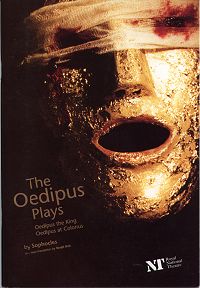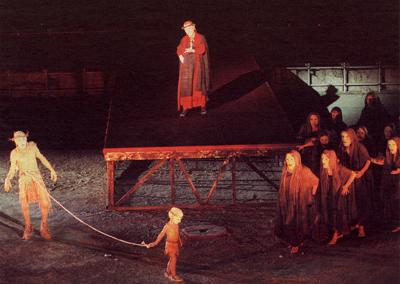The Oedipus Plays
 |
Production Information
Article /
The Independent / 14.8.96
Review /
Observer / 8.9.96
Review /
Daily Telegraph / 2.9.96
Review
/ Daily Telegraph / 19.9.96
Review
/ The Spectator / 7.9.96
Review /
Guardian / 4.9.96
Review
/ Guardian / 19.9.96
Review /
Independent on Sunday / 8.9.96
Extract /
Unmasking Oedipus / NT Publication / 1996
Review /
What's On London / 25.9.96
Review / The Times / 2.9.96
(below) |
Oedipus goes home.
|
The history of the theatre is spattered with
attempts to isolate the spirit of its Ancient Greek beginning. On Saturday
night in Epidaurus, on a long, narrow, red raked stage that stretched from a
circle of sand to a distant backdrop of pine trees, Sir Peter Hall's National
Theatre company won itself a spectacular place in that history.
The essential problem is familiar. The
tragedies that were written for the religious festivals of 5th-century Athens
became the fundament for all subsequent European theatre: if that had not been
the case these plays by Sophocles would be of only scholastic interest today.
Yet the choruses, masks and rituals which power these plays come from a society
that was fundamentally different from our own. |
 |
|
Photograph ©
Michael Powell www.michaelpowell.com |
At the heart of Greek tragedy is an enormous power.
Directors and actors risk becoming like astronomers in search of the Big Bang;
the closer that they come to the origins of their subject, the greater the
turbulence and distortion.
Sir Peter Hall is a man long tempted by the pursuit
of tragic purity. For his first National Theatre production since his departure
as director in 1988, he has chosen Sophocles's Oedipus the King, the
play which Aristotle designated the most perfect tragedy of all. He has drilled
his cast into a rigorous and rhythmic delivery, powerfully reflective of an age
when metre, more than writing, was the general means of memory.
He has given huge attention to the effect upon the
actors of wearing their white-on-white or sand-against-blood coloured masks. He
has directed almost every speech to be delivered out to the participating
audience and not in to the other actors. And he brought the final rehearsals
and first performance to Epidaurus, the Greek town whose ancient theatre he has
made almost a second theatrical home.
Yet Peter Hall is not too ambitious a purist. He is a
realist about what works before an audience and what does not. Dionysis
Fotopoulos's plague-blighted landscapes, studded with oildrum fires and dead
cattle, do not take us back quite as far as the theatre's Big Bang. Indeed,
much of the immense emotional pull of The Oedipus Plays (Oedipus the
King and its later sequel, Oedipus at Colonus), comes from later
more liberating spirits, many of them from Epidaurus itself.
Despite the enthusiastic claims of the National
Theatre press release, Epidaurus is not the place where Sophocles's plays were
originally performed. Its colossal theatre, which held a rapt audience of
almost 10,000 on Saturday, was not built till at least the end of the 4th
century BC. It represents a time when tragedy was still in touch with its roots
but when its branches were beginning their climb into the broader culture of
the West.
The stone terraces, which so strain the backsides of
modern sitters, were laid down only when the great 5th-century playwrights were
dead. If these stones could speak they would remember more of the spectacular
than of the religious, of men rather than gods, the universal rather than the
patriotic. Every performance here of the Oedipus plays in the past 2.000 years
has been a revival. The original 5th-century production in Athens would not
have had a place for a star like Alan Howard, whose silky-toned Oedipus here
was one of those rare glories of an actor's art. But in 4th-century Epidaurus
the star-system was already setting in. Sacred texts were being cut to suit the
whim of such pioneer prima donnas as the famed Theodorus, who would not allow
any other actor to come on stage before he did. Masks were still worn but had
probably lost their early thrill.
Gestures, too, were beginning to be of the kind that
a National Theatre cast would recognise. A vase painting survives in Syracuse
which shows the scene where Oedipus, Jocasta and their children learn almost
the last bit of proof about the family's murderous and incestuous ties. When
the hero finds that his efforts to evade the prophecy of his birth have failed
(he has killed his father and married his mother) and that his efforts to
discover the truth have succeeded all too well, he shows his anguish with one
hand against his chin and the other dug into his hip. Jocasta cups a narrowed
hand against her pure white cheek. The messenger looks away and bends behind a
yokel's cloak. This compulsive moment - easily recognisable in Alan Howard and
Suzanne Bertish's relationship on the Epidaurus stage - is a living link from
their world to ours.
These two Oedipus plays - the first conceived in days
of greatness and hope for Athens before the Peloponnesian War and the second in
the dark days of defeat 30 years later - were far apart in original tone and
style. But in revival, despite awkward differences in some of the characters
who appear in both, they have become a popular pairing.
They are plays without active gods - a big benefit
for modern audiences. Greg Hicks serpentine prophet, Tiresias, whose divine
message is delivered with rather too much pelvic thrust, was one of the least
convincing elements. These are dramas of active people with fatal drives and
emotions like our own. Alan Howard's measured tenor voice and sliding arm
motions (amazing in themselves from a man who broke his right wrist at the
dress rehearsal) become gradually more puppet-like; but he is never an
automaton in the full grip of fate.
Peter Hall has reached as close to the heart of these
plays - their themes of crumbling vision and concentrated pride - as I ever
expect to be taken. With a few changes to some obvious points of bathos in
Ranjit Bolt's translation, this distillation of the tragic spirit should be
good for a long time.
The audience's final pity is skilfully concentrated
upon those most universal of all its recipients, the children. For the blinded
Oedipus Tyrannos, his miserable offspring are the way of leading us from one
man's suffering to the suffering of all. For the dying Oedipus at Colonus they
are his guides into the hands of gods who may just be within his and our
understanding - but more likely are not.
Peter Stothard. (Editor of The
Times)
The Times. 2.9.96.
Back to Reviews
page.

